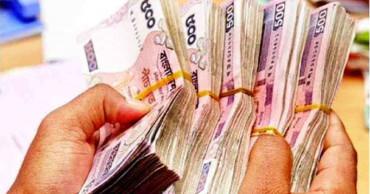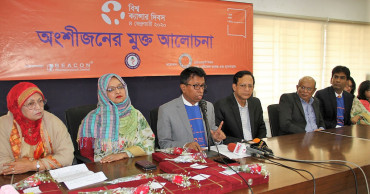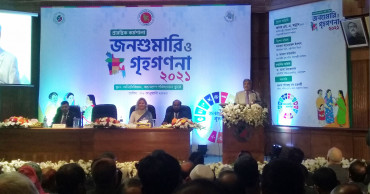Bangladesh Bureau of Statistics (BBS)
Food safety concerns mount as Bangladesh’s eatery industry expands unchecked
Despite the rapid expansion of Bangladesh’s food service industry, encompassing hotels, restaurants and roadside tea stalls, concerns over food safety remain largely unaddressed, contributing to serious public health risks.
A recent survey by the Bangladesh Bureau of Statistics (BBS) reveals that the number of food establishments across the country has almost doubled in a decade, reaching 436,274 in 2021.
Restaurant owners threaten strike if govt doesn’t reconsider VAT hike plan
This sector now employs approximately 2.1 million workers. But the lack of proper regulation and food safety measures means that a significant portion of the population continues to consume unhygienic food daily.
During visits to various roadside eateries in areas such as Motijheel, Shahbagh, and Paltan, the UNB correspondent found that many people opt for these establishments due to their affordability.
Sellers said that despite offering meals at low prices, they manage to make a profit as their operating costs are lower than those of conventional restaurants.
‘Harassment in the name of crackdown’: Restaurant owners allege disarray in fire incident response
When asked about hygiene standards, sellers insisted that their food was fresh and prepared in their homes by family members or employees following proper practices. But public health experts warn that such informal assurances do not guarantee food safety.
Rapid Growth but Limited Regulation
The BBS’s Hotel-Restaurant Survey 2021 highlights that of the total food service establishments, 344,687 are roadside tea stalls, with 159,393 in urban areas and the remainder in rural regions.
The country also has 67,991 fast-food shops, 19,637 restaurants and mobile food vendors, and 126 catering services.
Despite the sector’s rapid expansion, regulation remains inadequate. Outside Dhaka, only 65,000 establishments are registered with the Bangladesh Hotel Restaurant Owners Association, leaving a vast majority unmonitored.
Over the past three decades, the number of hotels and restaurants has steadily increased—from 117,981 in 1992-93 to 215,103 in 2002-03, 275,324 in 2009-10, and 436,274 in 2021.
While male employment in the sector has more than doubled to 1.97 million in 2021 from 850,000 a decade earlier, the number of female workers has also risen significantly to 100,737.
Of the total establishments, only 852 are government-owned, with the rest operating under private ownership.
The number of short-stay hotels is recorded at 2,889 in urban areas and 301 in rural regions.
Health Experts Warn of Unsafe Food Practices
Professor Khaleda Islam of the Institute of Food and Nutrition emphasised that proper hygiene must be maintained in food preparation to ensure safety.
“Food must be stored correctly, cooked thoroughly, and kept at the right temperature. Safe water must be used in all cooking processes,” she said.
She also advised consumers to carefully inspect food before purchasing. “When buying fruits and vegetables, check for natural colour and freshness. Avoid rotten or foul-smelling produce. In the case of cooking oil, assess the fat content to ensure quality,” she added.
The Bangladesh Food Safety Authority Chairman, Zakaria, highlighted the severe consequences of consuming unsafe food. “According to the World Health Organisation, 80 people die from diarrhoea every day in Bangladesh, with an annual toll of 30,000 deaths. One of the major causes is the consumption of unsafe food,” he said.
Meat Sold Without Fitness Certificates
Another major concern is the sale of meat without proper health certification. Existing laws, including the Animal Slaughter and Meat Quality Control Act 2011, require veterinary surgeons to inspect animals before and after slaughter, ensuring their meat is safe for consumption.
However, this provision is largely ignored due to the lack of veterinary professionals and monitoring.
Dhaka’s two city corporations are responsible for ensuring hygienic meat sales, but their enforcement remains weak. Of the five designated slaughterhouses, two have been closed for years, and the remaining three are inadequately monitored. Traders blame the authorities for failing to regulate the sector, while city officials acknowledge a shortage of veterinary inspectors.
The Bangladesh Veterinary Association underscores the importance of thorough meat inspection.
DB increases surveillance on upscale restaurants after Bailey Road fire
“Animals must be tested 24 hours before slaughter in an antemortem examination, and their meat must be examined after slaughter in a postmortem examination. This helps detect infections in organs like the liver and lungs, which can pose significant health risks if consumed,” a spokesperson explained.
Lack of Oversight Puts Consumers at Risk
Despite regulations under the Safe Food Act, which prohibits selling meat from diseased animals and prescribes penalties of up to three years’ imprisonment or a fine of Tk 12 lakh for repeated violations, enforcement remains weak. Sellers claim they can visually assess an animal’s health before slaughter, but experts warn that diseases may not always be detectable without proper examination.
Between January and December 2024, a total of 89,742 cows, goats, and buffaloes were slaughtered at the Dhaka North City Corporation’s slaughterhouse. The Dhaka South City Corporation reports that between 120 and 135 cows, seven buffaloes, and 780 to 800 goats, khasi, and sheep are slaughtered daily. But the shortage of veterinary professionals further exacerbates concerns.
While DSCC is supposed to have 10 veterinary doctors and 20 inspectors, it currently has only six. The DNCC, meanwhile, has no veterinary surgeon and only one inspector.
With unsafe food practices persisting across Bangladesh’s food industry, experts stress the urgent need for stricter enforcement of regulations and improved public awareness to protect consumers from preventable health risks.
1 year ago
BBS thanks Walton for providing Tab in population & housing census
Bangladesh Bureau of Statistics (BBS) has thanked Walton for providing all-out support in the successful completion of the country's first digital population and housing census by providing timely tab delivery and other necessary services.
Bangladesh's first digital 'Population and Housing Census 2022' has been successfully completed. In this first digital census project, which was conducted across the country from June 15 to 21 of this year, Bangladeshi technology products manufacturer 'Walton Digi-Tech Industries Limited' provided Tab (Tablet PC), said a press release.
Recently, BBS sent a thanks letter to Walton Digi-Tech's Managing Director SM Monjurul Alam.
The letter signed by BBS Secretary Shahnaz Arefin NDC said that one of the major components of implementing the digital census was to ensure timely delivery of tablet PCs, reaching those the field level, after sales service and quick technical support during the census. Walton performed those duty very actively and effectively.
Walton Digi-Tech Industries Limited deserves appreciation for being actively involved in this country's largest statistical event. Walton's contribution to the successful implementation of the country's first digital census is gratefully remembered by the Department of Statistics and Information Management and the Bangladesh Bureau of Statistics.
Read: Walton brings 3-in-1 converter AC with Bluetooth, air plasma technology
BBS hoped that this census, the largest source of the country's real socio-economic and demographic data, will play significant role in formulating, evaluating and monitoring any evidence-based development projects such as Delta Plan 2100, Vision 2041, Eighth Five Year Plan, Sustainable Development Goals (SDGs) etc.
Walton supplied total of 3.95 lakh pieces of tab and 72 pieces of air conditioners in the 'Census and House Census 2022' project. In this project, Walton ensures all kinds of services, including technical and after sales services, up to the union level for about 4 lakh enumerators. As a result, the population and housing census activities were completed on time, accurately and smoothly.
According to the stakeholders, the successful completion of important projects like the first digital census of the country through using the domestic brand Walton Tab is very significant. This proves that the country's major projects, along with the participation of the domestic company, have been successfully completed through the use of locally manufactured products. As a result, the country and the domestic industry will be benefited, import cost will be reduced, domestic industries will be flourished, employment opportunities will be created as well as domestic economy will be progressed.
Walton Digi-Tech's Deputy Managing Director Engineer Liakat Ali said, “We are very happy to supply tabs and services to the country's first digital population and housing census project. Thanks and gratitude to all concerned for trusting 'Made in Bangladesh' tagged digital devices in this project, which is important from the socio-economic aspect of the country.”
“We hope that there will be participation of domestic institutions in such big projects in the future as well.”
3 years ago
For the first time, Bangladesh has more women than men
Bangladesh has witnessed a major demographic shift since record-keeping began in the country, with females outnumbering males for the first time in a population census.
Of a total population of around 16.5 crore recorded in the latest census, 81,712,824 are males and 83,347,206 females -- which means that for every 100 females, there are 99 males. The transgender count, on the other hand, is 12,629.
This has happened for the first time in the history of independent Bangladesh and that too under a female Prime Minister who has undertaken a slew of measures for gender equality and women empowerment since coming to power.
The provisional data of the '6th Population and Housing Census 2022' was revealed by the Bangladesh Bureau of Statistics (BBS) at a presser at Bangabandhu International Conference Center in Dhaka on Wednesday.
The Census was supposed to end on June 21 but due to floods in the north-eastern districts, it continued till June 28.
Read: Population Census gives right picture of country: Dipu
Except Muslims, the population of other religious communities has decreased in the country, according to the preliminary report of the Census that has pegged the country's exact population figure at 165,158,616.
While Muslims constitute 91% of the population, Hindus are 7.95% -- a decrease from the 2011 census when it was pegged at 8.54%. The Buddhist population has also decreased to 0.61% in 2022 from 0.62% in 2011.
Jatiya Sangsad's speaker Shirin Sharmin Chowdhury, Planning Minister MA Mannan, State Minister for Public Administration Farhad Hossain and State Minister for Planning Shamsul Alam were present on the occasion.
As per the report, the average annual population growth rate in Bangladesh is 1.22%. The average population growth rate in the 2011 census was 1.37. The population density has increased to 1,119 people. In the last census, it was 976.
The signature (people able to write) rate population has increased to 74.66% from the previous census figure of 51.77%.
Similarly, 55.89% of mobile phone users are aged over five years. The number of internet users is 30.68% of the total population.
Now, the total number of restaurants in the country is 4.10 crore. In the last census, it was 3.21 crore. The number of families -- with four members -- is now 4.10 crore.
3 years ago
Bangladesh per capita income surges to US$ 2,824
The country’s per capita income increased by US$ 233 to US$ 2,824 during FY22, as per a provisional estimate of Bangladesh Bureau of Statistics (BBS).
Planning Minister MA Mannan disclosed this at a press briefing after the meeting of the Executive Committee of the National Economic Council (Ecnec) held at the NEC conference room here on Tuesday.
Also read: Growing per capita income contributed to reduce child marriage: Planning Minister
Prime Minister Sheikh Hasina chaired the meeting, joining it virtually from her official residence Ganobhaban.
“Our per capita income went up to US$ 2,824 or Tk 241,470 in the 2021-22 fiscal, which was US$ 2,591 in the last fiscal (2020-21),” said Mannan.
The GDP’s provisional estimate was done done based on the available data and statistics of 6-7 months of the current 2021-22.
As per the estimate, the GDP growth rate is 7.25 per cent in the FY22, which was 6.94 per cent in the last fiscal year, said the minister.
Also read: Don’t evaluate Bangladesh by Sri Lanka model: Mannan
The country’s GDP has increased to US$ 465 billion (Tk 39,76,500 crore) in the 2021-22 fiscal from US$ 416 billion (Tk 35,30,200 crore) in the 2020-21 fiscal.
Among the three major sectors, the growth rates are 2.20 per cent in the agriculture sector, 10.44 per cent in the industrial sector and 6.31 per cent in the service sector.
3 years ago
Rebased GDP increases per capita income by almost 16%
Bangladesh's per capita income has increased to $2554 (USD) from $2227, a jump of nearly 16 percent, thanks to a new base year for calculating the country's gross domestic product (GDP).
The government recently finalized 2015-16 as the new base year to calculate (GDP). All national accounts will from now on be based on this new base year. Previously the government was using a base year of 2005-6.
Officials at the Bangladesh Bureau of Statistics (BBS) said the marked increase in the size of the GDP itself and attendant changes in per capita income will accrue mainly due to the inclusion of some new sectors in the calculation and price changes between the two periods.
Read:Per capita income in Bangladesh rises to US$ 2,227
Rebasing the GDP is the process of replacing an old base year with a more recent base year to keep up with the evolution in prices. In Bangladesh, the usual practice was to revise GDP base year every 10 years. The last time it was done was in 2013, when the base year was changed from 1995-96 to 2005-06.
However economists contend that increased economic growth and per capita income are not translating to a balanced distribution of national income among the people, leading to increased inequality where the benefits of growth are reaped by the few, not the many. Inequality has been further exacerbated during and by the Covid-19 pandemic, they said.
Selim Raihan, executive director of the South Asian Network on Economic Modeling (SANEM), was one of the economists who raised that point to UNB, even as he conceded there was some benefit from the relatively high economic growth, i.e . GDP growth, and its attendant per capita income growth.
“The ordinary people are benefiting from something. But it remains to be seen whether those gains will contribute to a transformation in the livelihoods of poor people,” he added.
The new base year means GDP figures for every year since will also change. As such, the per capita income for the 2015-16 fiscal year has now gone up to $1737 from $1465 in the old calculation
For the 2019-2020 fiscal, the per capita income has gone up to $2335 from $2024.
The news that Bangladesh had surpassed big neighbour India on the per capita income score, a measure of prosperity, caused a big ripple in 2020. According to the International Monetary Fund's (IMF) latest forecast released last month (October), Bangladesh is likely to maintain that lead through to the next fiscal - a shift from its earlier position that India was likely to quickly regain the lead.
Read: Bangladesh aims to attain 8 per cent GDP growth in 3 years: official document
But now it estimates Bangladesh's per capita GDP at current prices will be $2,138 in 2021, while India's will be $2,116. The rebasing is likely to bump the lead even higher.
India last rebased its GDP in 2015, a change that had bumped up the figure substantially. Nigeria's last rebasing in 2012 increased the size of its economy (GDP) by nearly 90 percent.
Rebasing is important in emerging economies with large informal sectors such as Bangladesh to capture more and more sections of the informal economy under formal reporting of national income, besides new or budding sectors that are growing fast. The new estimate of GDP comprises 21 broad sectors instead of the previous 15.
Talking to the news agency, a BBS official said the main objective of the project was to sensor modernisation of national accounts and related statistics in line with international guidelines and recommendations.
The other specific objective of the project is to improve different methods of GDP compilation. Updating GDP data series (base 2005-06) from 1972-73 to date, and developing a database on GDP (base 2015-16) from 1972-73 to date using software, will also fall under the project.
4 years ago
Post-pandemic recovery depends on reliable data
The recovery of the country’s economy following the coronavirus crisis is long and slow due to data scarcity, experts say.
5 years ago
Ensure more jobs for women to achieve desired prosperity: Experts
Though women’s contributions to the economy has increased significantly over the years with many becoming entrepreneurs these days due to a women-friendly policy, experts have underscored the need for ensuring more jobs for women to achieve the country’s desired goals.
5 years ago
Bangladesh has ‘15 lakh’ cancer patients, ‘1.5 lakh’ die each year
There are around 15 lakh cancer patients in Bangladesh with 1.5 lakh of them dying each year, said an expert here on Tuesday.
6 years ago
6th Population and Housing Census next year
The sixth Population and Housing Census (PHC) will be conducted across the country from January 2 to 8 in 2021 to find out demographic and socio-economic facts to be used for the next course of the country’s development planning.
6 years ago






.jpg)







